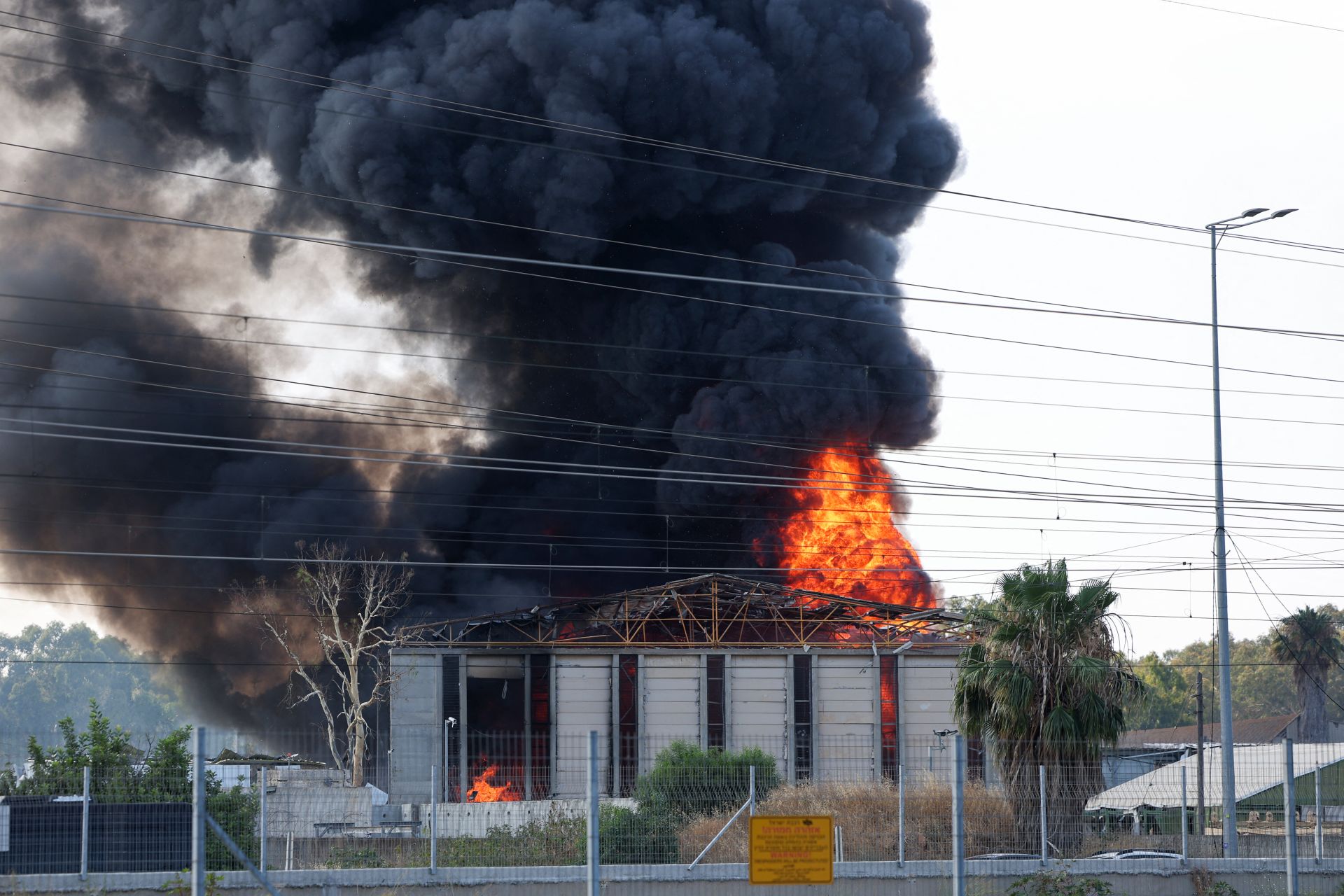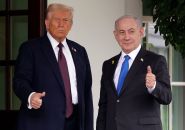- Home
- Middle East
- Fifth Night of Israel-Iran Clashes: Missiles, Casualties, Diplomatic Deadlock

Smoke billows from a fire in a building in Herzliya near Tel Aviv following a fresh barrage of Iranian rockets on June 17, 2025. ©Jack GUEZ / AFP
The military conflict between Israel and Iran escalated for a fifth consecutive night on Tuesday, with ongoing missile exchanges fueling growing concern among world powers.
Despite repeated international calls for de-escalation, Tehran and Tel Aviv remain locked in an unprecedented military confrontation that began with Israel’s offensive last Friday, aimed at preventing Iran from acquiring nuclear weapons. In retaliation, Iran has launched a series of drone and missile strikes.
Missiles and Explosions Hit Both Capitals
In the early hours of Tuesday, Iranian missiles were detected heading toward Israel, triggering sirens across the country, especially in the north. Civilians were briefly ordered to take shelter before the alert was lifted. Five people were injured when a strike hit a parking lot in central Israel, igniting a fire that engulfed a bus.
Iran said it destroyed strategic targets in Israel overnight using drones.
"Various types of destructive drones, equipped with precise destruction and targeting capabilities, destroyed strategic positions of the Zionist regime in Tel Aviv and Haifa," General Kioumars Heidari, commander of the army's ground forces, was quoted as saying by state television.
In turn, Israel intensified its targeted strikes on Iranian military infrastructure. One of the most symbolic targets was the headquarters of the state broadcaster IRIB in Tehran, which was hit mid-broadcast, abruptly cutting a live program. A presenter was seen fleeing the set as the ceiling collapsed around her. Three Iranian Red Crescent medics were also killed in a bombing in the capital.
Since Friday, Iran’s retaliatory attacks have killed 24 people in Israel, according to Prime Minister Benjamin Netanyahu’s office. In Iran, official figures released Sunday reported at least 224 dead and over 1,000 injured.
Air Defenses Activated as Panic Grips Tehran
Fear has gripped the Iranian capital. Tehran’s Grand Bazaar remained closed on Monday, gas stations were overrun, and store shelves emptied as panic spread. Air defenses were activated on both sides, and Iran’s airspace was temporarily closed. Explosions were heard in several Tehran neighborhoods, and heavy traffic clogged roads leading out of the city toward Karaj and Chalus after an evacuation message circulated online, notably amplified by U.S. President Donald Trump.
“Everyone should evacuate Tehran immediately,” Trump posted on Truth Social, having left the G7 summit in Canada early to monitor the conflict. He blamed Iran for not signing a nuclear deal “when I told them to,” calling the situation a “waste of human life.”
Trump Mobilizes Pentagon, Beijing Evacuates, Paris Sounds the Alarm
In response to the ongoing crisis, Trump ordered the deployment of additional “resources” to the Middle East. The USS Nimitz aircraft carrier, previously stationed in the South China Sea, is now reportedly en route to the region. China has urged its citizens to leave Israel “as soon as possible,” while Jordan has reportedly stepped up border security.
Diplomatic efforts are faltering. During the G7 summit, Western leaders condemned Iran’s strikes but warned against any attempt to force regime change. French President Emmanuel Macron said that “trying to change the regime in Iran by force would be a strategic mistake,” and called for an immediate end to attacks on civilians and vital infrastructure.
Trump’s early departure from the G7 disrupted the summit’s final day. “Due to developments in the Middle East, President Trump will leave tonight after dinner with other G7 leaders,” White House spokesperson Karoline Leavitt announced Monday night on X.
However, Trump later denied he was leaving to engage in ceasefire negotiations, contradicting Macron who had said his departure was due to the latter. “He has no idea why I am now on my way to Washington,” Trump posted on Truth Social. “But it certainly has nothing to do with a Cease Fire. Much bigger than that.”
Backchannel Diplomacy?
According to Axios, the White House is exploring the possibility of a meeting this week between U.S. envoy Steve Witkoff and Iranian Foreign Minister Abbas Araghchi. The goal: to explore a diplomatic breakthrough involving a new nuclear deal and an end to the Israel-Iran war. While not yet confirmed, the meeting is seen as a last-ditch effort by Trump to pivot from war to dealmaking.
A senior U.S. official told Axios that Trump views the U.S. military’s possession of massive bunker-buster bombs, which could target Iran’s underground enrichment site at Fordow, as key leverage in pushing Iran to negotiate. “He thinks in terms of deals and leverage. And this is leverage,” the official said. “They do want to talk,” he added. “But what we don’t know is whether they’ve been brought fully to their knees to realize that to have a country, they must negotiate.”
Despite escalating rhetoric, Trump remains convinced he can strike a deal, especially given Iran’s weakened position. Speaking from the G7, he said, “I think a deal will be signed. I think Iran is foolish not to sign one.” Macron confirmed the offer to Iran, adding, “We’ll see what happens.”
Nuclear Targets and Collapsing Talks
Israel claims to have struck hundreds of targets, including nuclear facilities. One strike reportedly destroyed “the main facility” at Iran’s Natanz uranium enrichment site. However, the International Atomic Energy Agency (IAEA) stated that it had not observed any damage to the site’s underground portion, where the core centrifuges are housed.
The flare-up derailed a planned round of U.S.-Iran nuclear talks that was due to take place in Oman on Sunday. Tehran pulled out of the negotiations following the Israeli strikes. The U.S. and Israel accuse Iran of secretly seeking to develop a nuclear weapon.
Toward Regime Change?
Israeli Prime Minister Benjamin Netanyahu struck a defiant tone in a press conference on Monday, claiming responsibility for the killing of several senior Iranian military figures, including three chiefs of staff, an air force commander, and two intelligence officers. “We are eliminating them one by one,” he said, calling on the Iranian people to rise up against the Islamic Republic. He added that the death of Supreme Leader Ali Khamenei “would end the conflict.”
The remarks drew sharp criticism. Iranian Foreign Minister Abbas Araghchi accused Trump of “not taking diplomacy seriously,” adding on X, “One phone call would be enough to silence Netanyahu.”
The Israeli army said on Tuesday that it had killed Iran’s newly appointed Chief of Staff, Ali Shadmani, in Tehran Monday night.
Read more




Comments